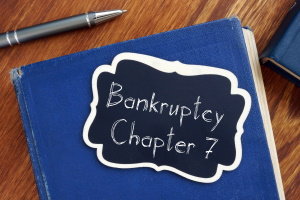If you come across the phrase “reaffirm car loan” you’re likely in the process of filing for Chapter 7 bankruptcy or you’re already in the bankruptcy process. A reaffirmation agreement allows you to keep your financed vehicle during Chapter 7 bankruptcy – if you meet certain requirements.

What Does Reaffirming a Car Loan Mean?
Reaffirming Your Car Loan In Bankruptcy
A reaffirmation agreement in Chapter 7 bankruptcy is when you sign an agreement with your auto lender stating that you can continue to make the payments as normal so you can keep your car. However, you must prove to the court that keeping this vehicle is necessary and show that you can afford it.
After you reaffirm an auto loan, the car loan is not included in your bankruptcy at all. Your auto loan continues as normal and you can’t discharge the balance in your bankruptcy. Meaning, if you end up defaulting on the loan, the lender can repossess the car, sell it at auction, and you’re responsible for any balance left over from the auction and repo fees.
You’re fully responsible for the debt after you sign the agreement unless you rescind it within 60 days of signing it, according to the legal website Nolo.com. You may also be able to cancel the reaffirmation agreement before your bankruptcy enters discharge. To qualify for a reaffirmation agreement, you must be current on your auto loan. The vehicle must also meet your state’s exemption amounts. If your car is worth more than the exemption amount, you most likely aren't going to be able to keep it. In this case, your bankruptcy trustee is likely to sell it to pay down your debts.
Can I Change My Loan Terms During Reaffirmation?
Often, your auto lender requires you to keep the same loan terms that you agreed to when you reaffirm your auto loan. However, you may be able to negotiate some of them.
 When you’re in Chapter 7 bankruptcy, you have a little leverage with your auto lender when negotiating a reaffirmation agreement. Your lender knows that you could simply voluntarily surrender your car to get rid of all liability for the loan. Lenders usually lose money on repossessions like these. Therefore, it may be a better deal for everyone to reaffirm the auto loan and change a few terms to make it easier for you to afford the payments.
When you’re in Chapter 7 bankruptcy, you have a little leverage with your auto lender when negotiating a reaffirmation agreement. Your lender knows that you could simply voluntarily surrender your car to get rid of all liability for the loan. Lenders usually lose money on repossessions like these. Therefore, it may be a better deal for everyone to reaffirm the auto loan and change a few terms to make it easier for you to afford the payments.
Terms you may be able to negotiate can include a lower interest rate, the payment due date, or the loan term. While a change in payment date may just help you stay current on your loan, both a lower interest rate and a longer loan term may be options to lower your monthly payment.
The worst a lender can say is no. If they don’t work with you at all, and you’re worried about making the payments as they are currently, then it may be a good idea to surrender the vehicle. Once you’re discharged from Chapter 7 bankruptcy, you can typically get into another auto loan rather quickly with a subprime lender.
Bankruptcy Car Loans
After your Chapter 7 bankruptcy is discharged, you’re in the clear for finding another vehicle. However, many traditional lenders are wary of assisting borrowers with bankruptcy on their credit reports. You're likely to have a better chance of securing a car loan with a subprime lender.
Subprime lenders are third-party lenders that are signed up with special finance dealerships. They often assist borrowers who’ve gone through a bankruptcy, and those with tarnished credit reports. These lenders know that your credit reports only tell some of your story, so they examine many other aspects of your ability to take on new credit. This usually includes looking at your income, living situation, work history, and requiring a down payment.
Special finance dealerships can be tough to find, but we have an easier way to locate the lending resources you need after bankruptcy. Here at Auto Credit Express, we maintain a nationwide network of dealerships that are able to assist bad credit borrowers. To get matched to a dealer in your local area, fill out our free auto loan request form. We’ll get right to work finding you the resource you need for bankruptcy auto lending, and there’s never an obligation.

Senior Auto Financing Editor
Suggested Posts For You
Receive Free Updates
Get the latest credit tips, resources and advice delivered straight to your inbox.













